The Nigerian civil war, also known as the Biafran war which started on the 6th of July 1967 and ended on 15th of January 1970, was a war fought by Nigeria against Biafra to counter the secession of Biafra from the Republic of Nigeria. The Igbos felt they could no longer relate smoothly with the northern dominated federal government and saw secession as the only way to survive or avoid extinction.
The Immediate Causes of the Nigerian Civil War are:
- The first military coup of Jan., 15 1966 led by Major Kaduna Nzeogwu, was seen as an Igbo coup. Many Northern leaders like Prime Minister Abubakar Tafawa Balewa, Alahji Ahmadu Bello and so on were killed in the coup while some Igbo leaders were spared. Later, General Johnson Aguiyi-Ironsi was installed as the Head of State. This arose a flame of anger among the Northerners who sensed the dominance of the Igbos and were ready to retaliate.
- The second coup in Nigeria: A counter coup on July 29, 1966 which brought General Yakubu Gowon to power- A few months after the first coup, a northerner-led counter coup was staged in which General Aguiyi Ironsi was killed and General Yakubu Gowon became the new Head of State.
- The massacre of Igbos living in the northern part of Nigeria. After the first and second coup, tension had began to rise in Northern Nigeria where the embers of ethnic discrimination against the Igbos was glowing hard. It was at the peak of this discrimination that the massacre of the Igbos kicked off.
As a means of keeping the country united in the last result, the country was divided into twelve states from the former 4 regions by the Federal Military Government in May 1967. The former Eastern region under Lt. Col. Ojukwu saw the act of creating twelve states by decree without consultation as the last straw. And then, on the 30th of May, 1967, Lt. Col. Chukuemeka Odumegwu Ojukwu declared the existence and independence of the Republic of Biafra .
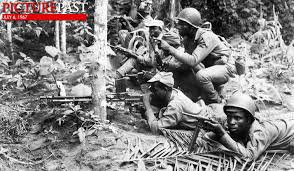
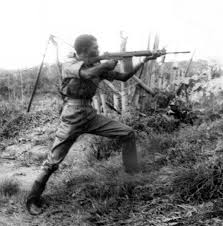
(Benjamin Adekunle aka Black Scorpion)
The FMG ordered the retake of the Eastern region back into Nigeria. On the 6th of July, 1976, the Nigerian federal troops marched in two divisions into Biafra. Division 1, led by Col. Shuwa operated through the north of Biafra, while the second Division advanced on Nsukka which later fell on July 14. On the 9th of July, the Biafrans retaliated by marching into the mid-western region of Nigeria across the Niger River, passing through Benin city and later stopped at Ore on August 21. This attack was led by Lt. Col. Banjo. The Biafran troops captured the mid-west easily because there was little repulsion from soldiers guarding the region. This infuriated Gowon and asked Col. Muhammad Muritala to form another division (Division 2) to drive the Biafrans out of mid-west and attack Biafra as well. The mid-west region was recaptured by the Nigerian army on the 20th of September.
Enugu was made the capital of Biafra, and later when Enugu was captured (Oct., 1967), Aba, Umuahia and Owerri served successively as the provisional capitals.
Within a year, the Federal Military Government (FMG) captured the city of Port Harcourt and many other costal oil facilities. The FMG blocked all the routes for transporting food into the Republic of Biafra which led to severe starvation. The FMG saw this as a war strategy and a way to keep Nigeria united, while many people around the world saw this as nothing but a genocide. The food flown in by foreign mercenary pilots was very little and couldn’t solve the starvation Biafra was facing. One of the notable mercenaries was the Swedish Carl Gustav Von Rosen who attacked Nigerian military airfields in Port Harcourt, Benin City and Enugu. Over 2 million Biafrans died of starvation. The FMG also attacked the Biafrans through air, land and sea, therefore leaving the Biafrans helpless and reducing their population drastically.
By the end of the year 1969, it was obvious that the war will soon come to an end. The FMG launched its final operation known as “Operation Tail-Wind” on January 7, 1970. The operation carried out by the 3rd Marine Commando Division and supported by the 1st and 2nd Infantry division. Owerri was captured on the 9th of January, while Uli fell on the 11th of that same January.
The self- acclaimed head of state of Biafra, Lt. Col. Ojukwu, aware of the hopelessness of the situation fled the Republic immediately with his family on the 10th of January, 1970. The commander of the Biafran army, who was left with the administration of the republic later surrendered to the Federal Government on the 14th of January, 1970, thus bringing the war and bloodshed to an end. The war officially ended on the 15th of January, 1970.
Further Reading:
* The Biafra War- Ekwe-Ekwe (1990)
* Civil War in Nigeria- Audrey Chapman (1968)
* Historical Analysis Of Nigeria- Biafra Conflict- Olawoyin (1971)
* The Biafra Story- Frederick Forsyth (1969)
Must Read: The Assasination of General Murtala Ramat Muhammed on February 13, 1976
Also read Professor Peller magical performances in the early 70s
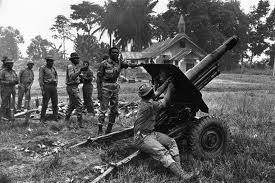
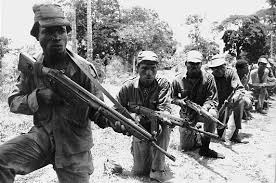
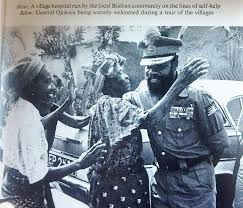
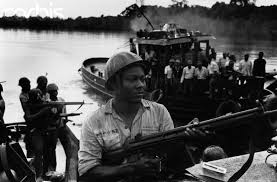
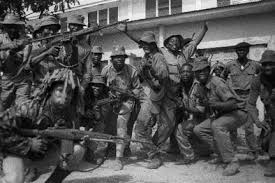
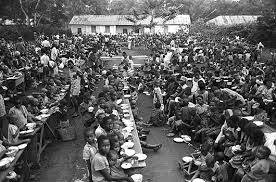
Waoo! Very interesting article, i love that..but i have a question to ask, did ojukwu surrender to Nigeria at last or is it just a peaceful reconciliation?
LikeLike
Nigeria is a great nation the whole African countries.
LikeLiked by 1 person
I love Nigerian old teams,may almighty God guide them and give them wisdom in Jesus name………. Amen.
LikeLiked by 1 person
Thanks for visiting, Mr. Saka Titus. Kindly do check back
LikeLike
God bless Nigeria
LikeLike
Our four fathers are great men in did
they make us to become who we are now
Nigerians please lest be one and lest live as peace and try to make it great once again.
LikeLike